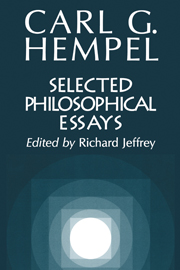PROBABILITY
Published online by Cambridge University Press: 05 June 2012
Summary
6 [5] “Über den Gehalt von Wahrscheinlichkeitsaussagen,” Erkenntnis 5 (1935), 228–60. Translation by Christoph Erlenkamp, revised by Olaf Helmer.
7 [14] “On the Logical Form of Probability-Statements,” Erkenntnis 7 (1937), 154–60. [16] “Supplementary Remarks on the Form of Probability-Statements, Suggested by the Discussion. (Participants: Braithwaite, Clay, v. Dantzig, Ditchburn, Lindenbaum, Mannoury, Storer, Waismann.), Erkenntnis 7 (1937), 360–3.
8 [24] With P. Oppenheim, “A Definition of ‘Degree of Confirmation,’” Philosophy of Science 12 (1945), 98–115.
Essay 6 is a translation of an article based on Hempel's Ph.D. dissertation. The essay argues for a view of probability as determined by empirical frequencies, while offering sympathetic but ultimately destructive criticism of the particular frequentist theories floated by Reichenbach and von Mises. The positive contribution of the article is a “finitization” of Reichenbach's approach.
The brief critical essay 7 also derives from the dissertation. It was read at the Fourth International Congress for the Unity of Science at Cambridge University in 1938. There, in a friendly spirit, Hempel identified an intractable difficulty that vitiates both von Mises's theory and Reichenbach's.
In the early 1940s, collaborating with Olaf Helmer and Paul Oppenheim, Hempel saw the project of logical empiricism as urgently needing a satisfactory account of how sentences can confirm or disconfirm other sentences. Unlike Carnap, the H2O trio sought an explication of degree of confirmation in partially empirical terms. The high-water mark in their hopes for the project (1945) is marked by essay 8 and by a parallel publication by Helmer and Oppenheim.
- Type
- Chapter
- Information
- Selected Philosophical Essays , pp. 85 - 88Publisher: Cambridge University PressPrint publication year: 2000



